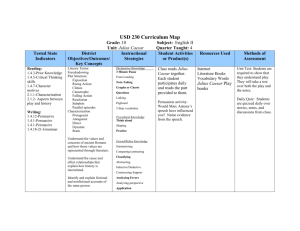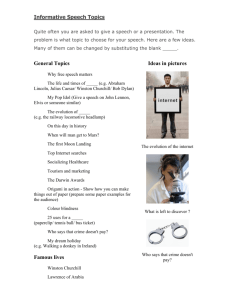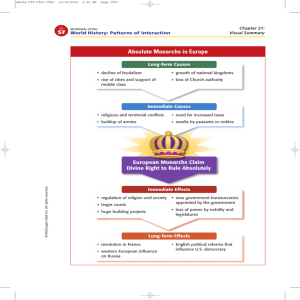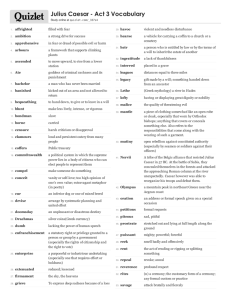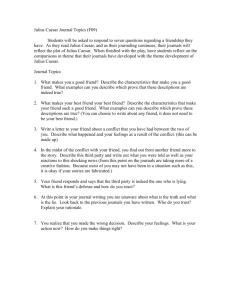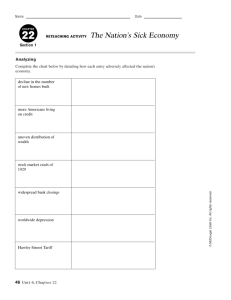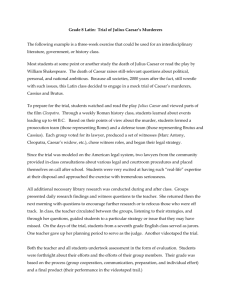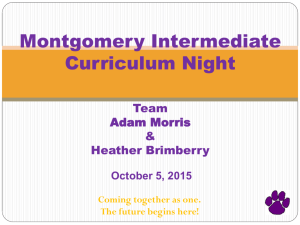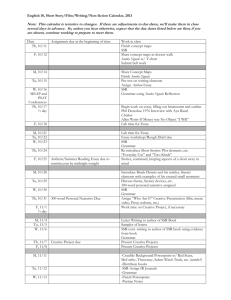English 10-1 - Palisades School District
advertisement
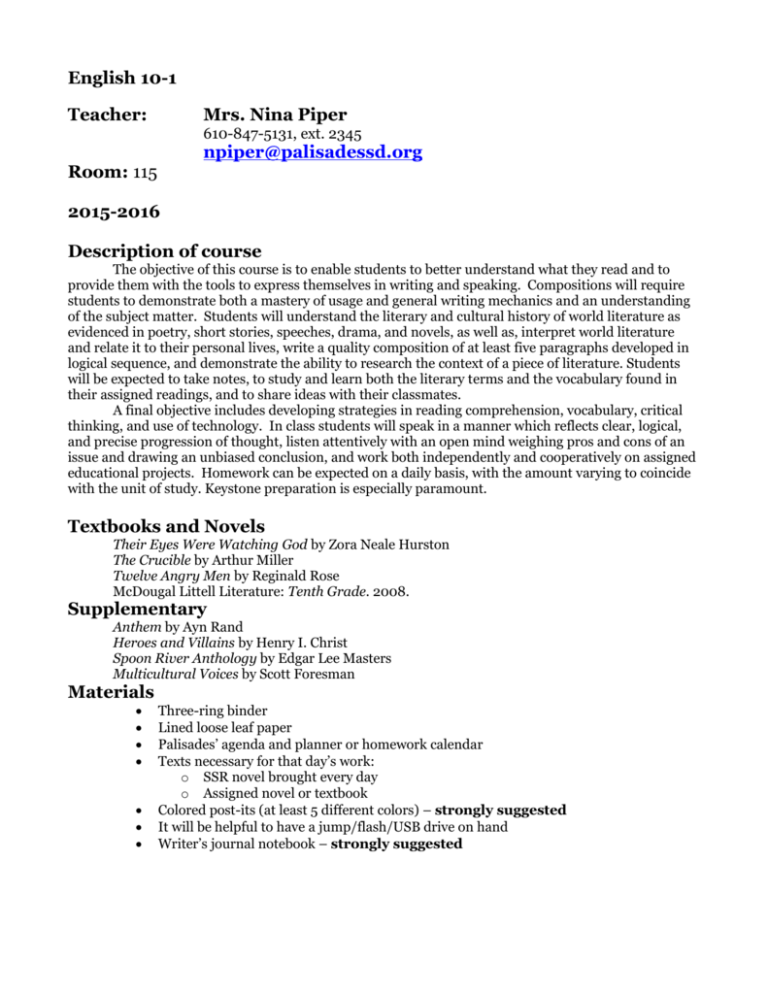
English 10-1 Teacher: Mrs. Nina Piper 610-847-5131, ext. 2345 npiper@palisadessd.org Room: 115 2015-2016 Description of course The objective of this course is to enable students to better understand what they read and to provide them with the tools to express themselves in writing and speaking. Compositions will require students to demonstrate both a mastery of usage and general writing mechanics and an understanding of the subject matter. Students will understand the literary and cultural history of world literature as evidenced in poetry, short stories, speeches, drama, and novels, as well as, interpret world literature and relate it to their personal lives, write a quality composition of at least five paragraphs developed in logical sequence, and demonstrate the ability to research the context of a piece of literature. Students will be expected to take notes, to study and learn both the literary terms and the vocabulary found in their assigned readings, and to share ideas with their classmates. A final objective includes developing strategies in reading comprehension, vocabulary, critical thinking, and use of technology. In class students will speak in a manner which reflects clear, logical, and precise progression of thought, listen attentively with an open mind weighing pros and cons of an issue and drawing an unbiased conclusion, and work both independently and cooperatively on assigned educational projects. Homework can be expected on a daily basis, with the amount varying to coincide with the unit of study. Keystone preparation is especially paramount. Textbooks and Novels Their Eyes Were Watching God by Zora Neale Hurston The Crucible by Arthur Miller Twelve Angry Men by Reginald Rose McDougal Littell Literature: Tenth Grade. 2008. Supplementary Anthem by Ayn Rand Heroes and Villains by Henry I. Christ Spoon River Anthology by Edgar Lee Masters Multicultural Voices by Scott Foresman Materials Three-ring binder Lined loose leaf paper Palisades’ agenda and planner or homework calendar Texts necessary for that day’s work: o SSR novel brought every day o Assigned novel or textbook Colored post-its (at least 5 different colors) – strongly suggested It will be helpful to have a jump/flash/USB drive on hand Writer’s journal notebook – strongly suggested Course schedule We will meet every day, one semester, for 90 minutes. Monday, Wednesday and Friday we will read S.S.R. for 15-20 minutes. Classroom Procedures 1. 2. 3. 4. 5. 6. 7. Food and drink are allowed in class as long as it is not a distraction or a mess. Be prepared with all required materials for the day. Be in your seat ready to learn when the bell rings. Limit the amount of sign outs from class. Use the lavatory before or after class, not during. Respect the class and the classroom. Purses and book bags must remain under the desk or on the floor Cell phones and other electronic devices should be silenced and out-of-sight unless otherwise instructed. *If procedures 1 through 7 are not followed, a warning will be issued. If the offense occurs again, a teacher detention will be assigned. Repeated offenses will warrant a phone call home and administrative notification. Essential Questions 1. 2. 3. 4. What is the impact of words in formulating meaningful sentences and paragraphs? How does language structure affect meaning? What is the impact of individuals on history? How does an author shape the cultural ideas about death, love, betrayal, fear, compassion and jealousy? Course content The Tragedy of Julius Caesar* 4 weeks The Crucible & Nonfiction Unit* 4 weeks With a focus on writing a research paper 1.1.11.B Analyze the structure of informational materials explaining how authors used these to achieve their purposes. Short Stories, Poetry, and Excerpts* 2 weeks 1.1.11.G Demonstrate after reading understanding and interpretation of both fiction and nonfiction text, including public documents Their Eyes Were Watching God* 3 weeks Twelve Angry Men 2 weeks Independent SSR novels* ongoing Vocabulary* ongoing Grammar ongoing Units noted with an * will be covered. Other units will be addressed if time permits and/or to meet class needs. Syllabus 2 Policies: i.e. plagiarism, lateness of assignments, cost of materials, etc Policies listed in the Palisades High School Student Handbook will be followed. Late vocabulary homework and other assignments under 10 points will not be accepted. Zero points will be awarded. The McDougal Littell textbook costs $90, so I ask that students carefully consider the way in which they handle the textbook. I do check that textbooks are returned in the same condition they were borrowed. English Department Second-Chance Learning Policy: • Retesting for tests is not available; however, students do have the opportunity to retake any quiz on which their score does not exceed a 69%. Students are expected to study in preparation for assessments, as they will be notified of these assessments in advance. • Essay revisions will be accepted for the writing pieces on which the student’s score does not exceed a 69%. This opportunity is dependent on whether the student has met all deadlines, as those papers that have been submitted late will not have the same opportunity. A revision’s score may not exceed a 70%. Academic Integrity Policies: It is expected that students and instructors will act responsibly and honestly in all aspects of the course. • Plagiarism/Cheating is the stealing or claiming of someone else‘s ideas or words as your own without crediting the source and/or aiding in this act. This includes submitting the same homework, projects, etc… as another student or sharing your work with another student unless group work is specified in writing by the instructor. • Students are responsible for keeping their account information private and ensuring that all work submitted is their own. The following penalties will be assessed if a student is found guilty of defying the academic integrity policies: 1. You will be given a zero as a final grade on that assignment. 2. Parental notification by the teacher will occur. 3. First offense will result in a one day in school suspension. (ISS) 4. Second offense will constitute out of school suspension. (OSS) 5. You will be denied privilege of membership in academic cubs for the remainder of the year. Any future recommendations given by teachers may also be affected. Description of how grades are earned Quarter 1 Quarter 2 Final Exam 40% of final grade 40% of final grade 20% of final grade Individual assignments are assessed using a point system. Methods of evaluation include the Informational Writing Rubric (created by English and Social Studies departments), project and presentation rubrics, tests, quizzes, and homework assignments. Syllabus 3 How can I get extra help? Extra help is always available after school in room 115. I would appreciate if you schedule a date in advance with me, so I can guarantee that I do not have any conflicts in my schedule, and I can prepare the necessary materials. Opportunities are provided for revising writing pieces. Students are strongly encouraged to complete all work by deadlines so that revisions will be accepted. Students are also encouraged to be proactive and seek information regarding retesting and/or rewriting. Additional reading, writing, and speaking are incorporated into units at all levels for students who would benefit from enrichment activities. Individual projects reflect the strengths and learning styles of the students. Extra credit is available only to those who complete assigned work and turn it in on time and will be discussed on an individual basis. Extra credit possibilities must be discussed on an individual basis and initiated by the student. Description of portfolio-quality project In your portfolio you must include a reading log, which should reflect those texts read for SSR and those covered throughout the course. You may also include a novel project, a writing piece, a speech evaluation, a research paper, or a video presentation. Some examples of portfolio-quality projects include, but may not be limited to: The Crucible/McCarthyism Research Project Sample of Narrative Writing (short story) Persuasive Writing Piece Julius Caesar Debate Julius Caesar Historical Context Essay “Course content may vary from this outline to meet the needs of this particular group.” Syllabus 4
